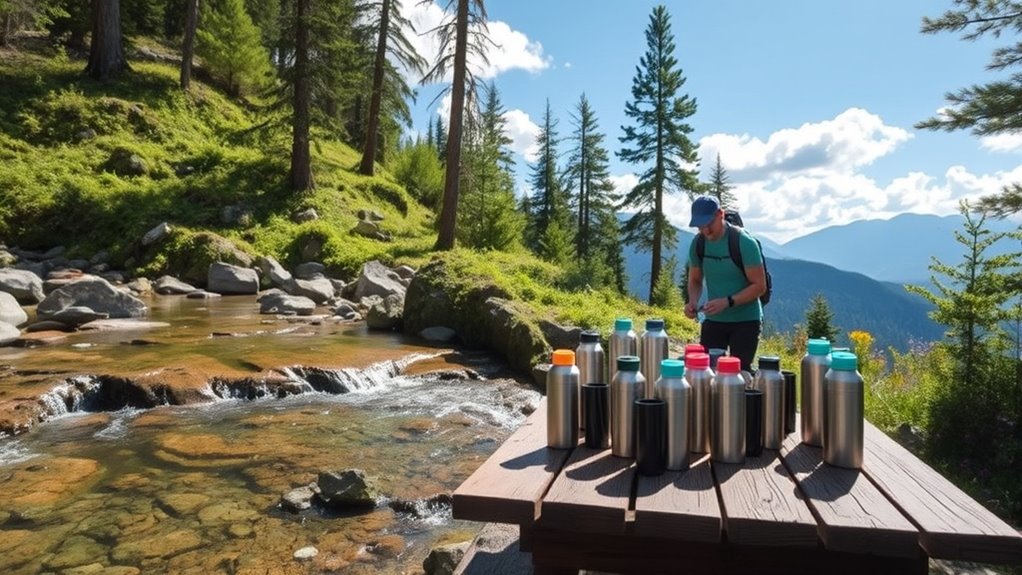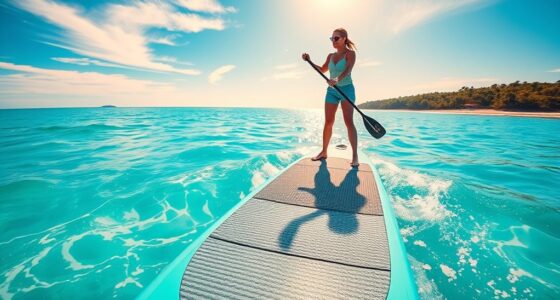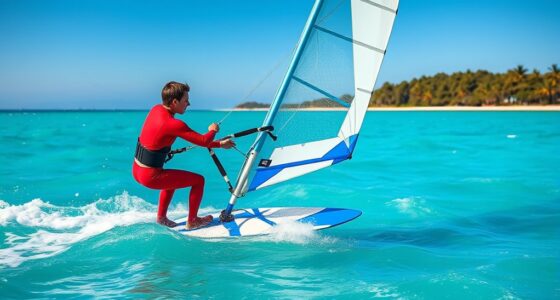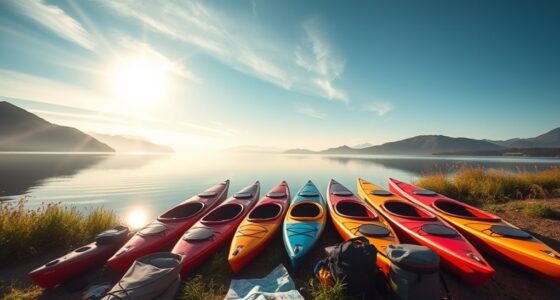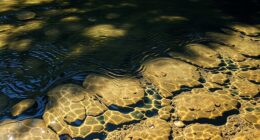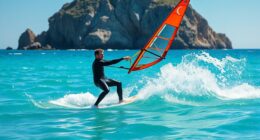To plan a zero-waste water adventure weekend, start by choosing eco-friendly gear like reusable bottles, biodegradable soap, and sustainable equipment. Pack snacks in reusable containers and plan meals ahead to avoid excess packaging. Practice Leave No Trace by bringing waste bags and respecting natural spaces, and opt for carpools or public transit to reduce your carbon footprint. By making mindful choices, you’ll protect the environment and enjoy a sustainable adventure—your next step is to explore more ways to minimize impact.
Key Takeaways
- Choose eco-friendly gear, reusable containers, and sustainable clothing to minimize waste and environmental impact.
- Pack snacks in bulk using reusable silicone bags and plan nutritious, minimally packaged meals.
- Prepare a waste management plan with reusable trash bags and follow Leave No Trace principles.
- Use eco-conscious transportation options like carpooling or public transit to reduce carbon footprint.
- Respect natural habitats by sticking to trails, avoiding wildlife disturbance, and practicing mindful environmental interaction.
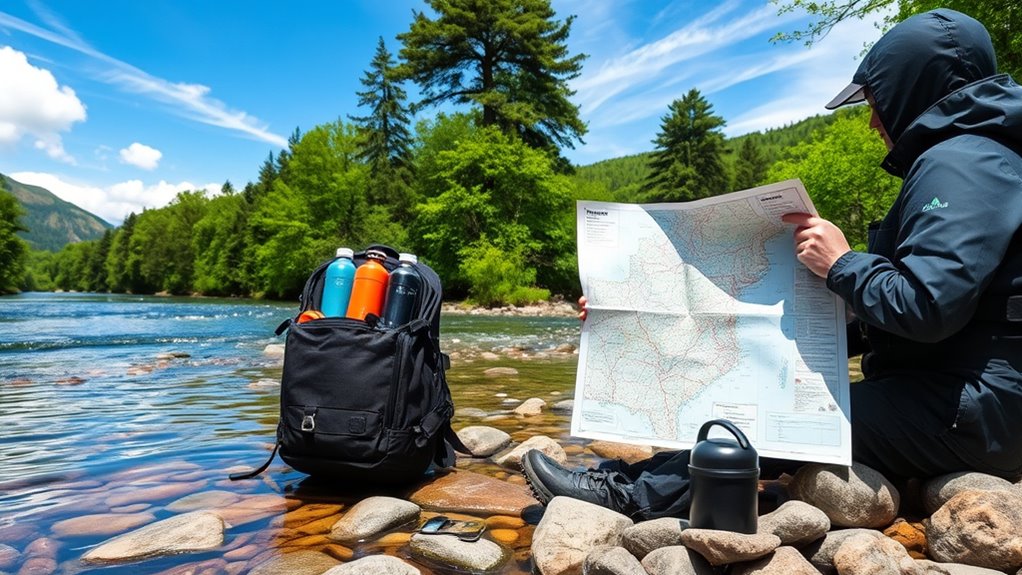
Starting on a zero-waste water adventure weekend is an exciting way to connect with nature while minimizing your environmental impact. When planning this kind of trip, the key is to prioritize eco-friendly gear that reduces waste and pollution. Choose reusable water bottles, biodegradable soap, and compact, lightweight gear designed for sustainability. Opt for gear made from recycled or sustainable materials, like bamboo utensils or organic cotton clothing, to lessen your carbon footprint. Remember, packing smart means bringing only what you need and avoiding single-use plastics that can end up polluting rivers and lakes.
Start your water adventure with eco-friendly gear, reusable bottles, and minimal waste for a sustainable trip.
Next, think about your snacks. Sustainable snacks are essential for maintaining energy without creating waste. Go for bulk items you can portion into reusable containers, rather than individual packaging. Trail mix, dried fruits, nuts, and homemade energy bars are excellent choices because they’re both nutritious and eco-friendly. Pack these in reusable silicone bags or glass containers to avoid plastic waste. Not only do these choices reduce trash, but they also support a more sustainable lifestyle beyond your adventure. Planning your meals and snacks in advance ensures you won’t be tempted to buy packaged food along the way, which often results in unnecessary waste.
When organizing your gear, consider how you’ll dispose of waste. Bring along reusable trash bags to collect all your waste, including biodegradable waste, so you can leave no trace. Make sure your gear includes a compact first aid kit, a multi-tool, and a lightweight, portable water purifier or filter. These items help you stay prepared while reducing reliance on disposable items like bottled water or single-use wipes. If you’re camping, choose a site that supports Leave No Trace principles, and use environmentally friendly cleaning products if needed. Additionally, understanding the importance of nutrient retention in raw foods can inspire you to include fresh, minimally processed ingredients in your meals, reducing packaging waste and maximizing health benefits.
Another important aspect is transportation. Reduce your carbon footprint by carpooling or using public transportation to reach your water adventure spot. If you’re kayaking or canoeing, ensure your boat and paddles are in good condition to avoid unnecessary waste from repairs or replacements. Consider renting equipment rather than buying new gear, which minimizes waste associated with manufacturing and shipping.
Finally, immerse yourself fully in the experience. Engage with nature respectfully, stay on designated trails, and avoid disturbing wildlife. Your mindful approach, combined with eco-friendly gear and sustainable snacks, not only makes your trip more enjoyable but also ensures that future adventurers can enjoy the same pristine environments. With careful planning and conscious choices, your zero-waste water adventure weekend becomes a meaningful journey that benefits both you and the planet.
Frequently Asked Questions
What Eco-Friendly Gear Is Essential for a Water Adventure?
When choosing eco-friendly gear for your water adventure, focus on items that promote water conservation and minimize waste. Opt for reusable water bottles, biodegradable soap, and eco-friendly dry bags. Look for gear made from sustainable materials like recycled plastics or natural fibers. By using eco-friendly gear, you help reduce plastic pollution and conserve water resources, ensuring your adventure remains enjoyable while protecting the environment.
How Can I Minimize Plastic Waste During Water Activities?
Did you know over 300 million tons of plastic are produced each year, much of which ends up in our waterways? To minimize plastic waste during water activities, you should always bring a reusable water bottle instead of single-use plastics. Also, opt for biodegradable sunscreen to protect your skin and the environment. These small changes make a big difference in keeping our waters clean and safe for everyone.
Are There Specific Locations Ideal for Zero-Waste Water Adventures?
You’ll find that local water spots often support eco-friendly tour operators committed to sustainability. These locations promote zero-waste water adventures by minimizing plastic use and protecting natural resources. Look for areas with clear regulations and eco-conscious businesses. By choosing destinations that prioritize environmental preservation, you make certain your water adventure stays fun and responsible. Research local spots and tour operators beforehand to guarantee your experience aligns with your zero-waste goals.
How Do I Ensure Safety Without Relying on Disposable Equipment?
Your safety shouldn’t be compromised for anything, not even a zero-waste adventure! To stay safe, always wear eco-friendly safety gear made from sustainable materials and pack plenty of reusable water containers to stay hydrated. Avoid relying on disposable equipment, which can break or pollute. Instead, choose durable, reusable gear that keeps you safe and minimizes waste, ensuring your water adventure is both fun and environmentally responsible.
What Sustainable Water Activities Are Suitable for Beginners?
You can start with eco-conscious travel by choosing responsible kayaking, which is beginner-friendly and environmentally mindful. Look for local outfitters that prioritize sustainability and use minimal-impact gear. Beginners should stick to calm waters like lakes or gentle rivers, avoiding strong currents. Always respect wildlife and leave no trace. This way, you enjoy water activities safely while minimizing your environmental footprint, making your adventure both fun and responsible.
Conclusion
So, after all that planning to avoid waste, you might find yourself splashing around just like everyone else—maybe even with a plastic bottle or two. Ironically, the best part of your zero-waste water adventure is realizing that the real waste isn’t in your gear, but in forgetting to enjoy the moment. Remember, sometimes the most wasteful thing you can do is stressing over perfection. So go ahead, make a splash and embrace the chaos!

